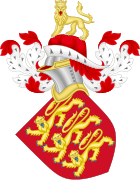Statute of Winchester
United Kingdom legislation From Wikipedia, the free encyclopedia
The Statute of Winchester of 1285 (13 Edw. 1. St. 2; Latin: Statutum Wynton̄), also known as the Statute of Winton, was a statute enacted by King Edward I of England that reformed the system of Watch and Ward (watchmen) of the Assize of Arms of 1252, and revived the jurisdiction of the local courts.[1][2] It received royal assent on 8 October 1285.
| Act of Parliament | |
 | |
| Long title | Statutum Wynton̄ |
|---|---|
| Citation | 13 Edw. 1. St. 2 |
| Territorial extent | England |
| Dates | |
| Royal assent | 8 October 1285 |
| Commencement | 8 October 1285 |
| Repealed | 1 January 1970 |
| Other legislation | |
| Amended by | |
| Repealed by | Statute Law (Repeals) Act 1969 |
Status: Repealed | |
It was the primary legislation enacted to regulate the policing of the country between the Norman Conquest and the Metropolitan Police Act 1829.[3] Of particular note was the requirement to raise hue and cry, and that "the whole hundred … shall be answerable" for any theft or robbery, in effect a form of collective responsibility.
Chapters
The Statute of Winchester is composed of six chapters:
| Chapter | Title |
|---|---|
| 1 | Fresh Suit shall be made after Felons and Robbers from Town to Town, &c. |
| 2 | Inquiry of Felons and Robbers, and the County shall answer if they be not taken. |
| 3 | This Act shall be respited until Easter next. |
| 4 | At what Times the Gates of great Towns shall be shut, and when the Night Watch shall begin and end. |
| 5 | Breadth of Highways leading from one Market-Town to another. |
| 6 | That View of Arms be made. Hue and Cry shall be followed. Fairs or Markets shall not be kept in Church-yards. |
See also
References
External links
Wikiwand - on
Seamless Wikipedia browsing. On steroids.
